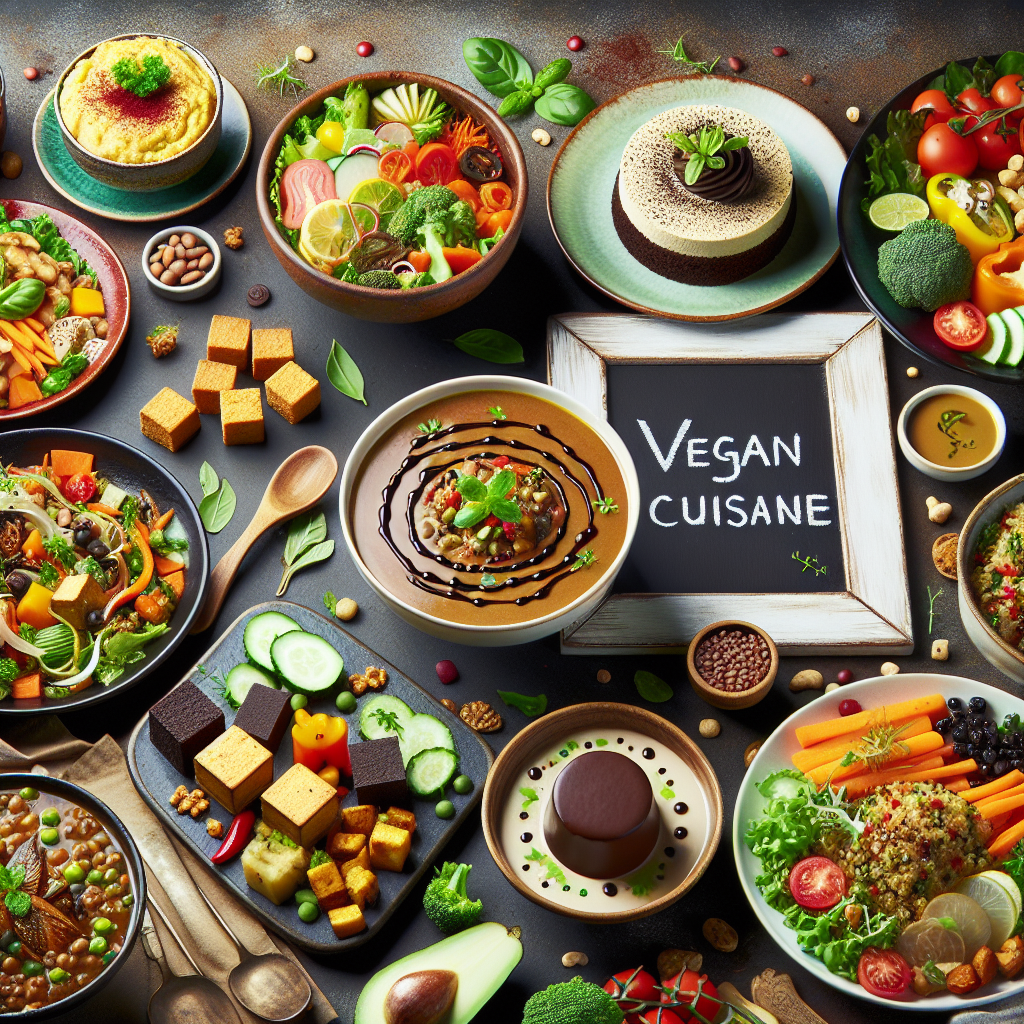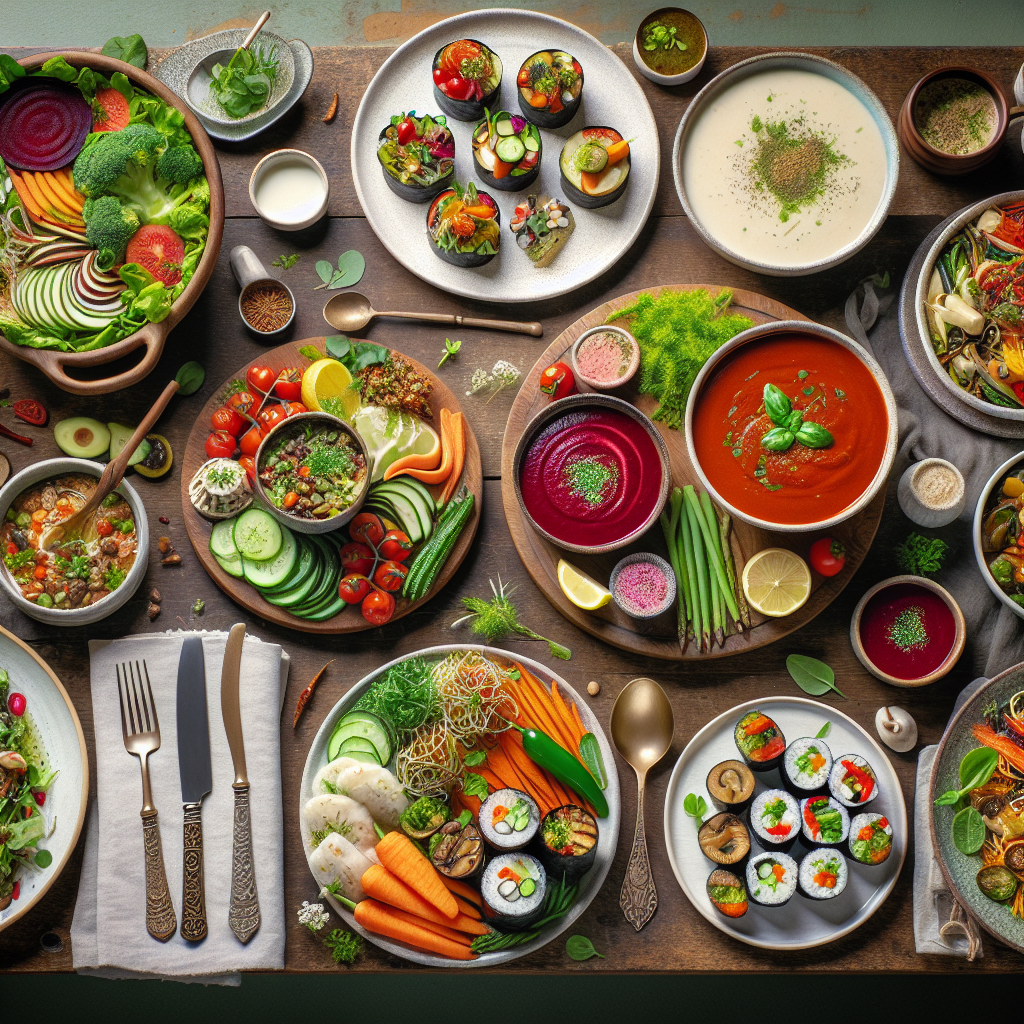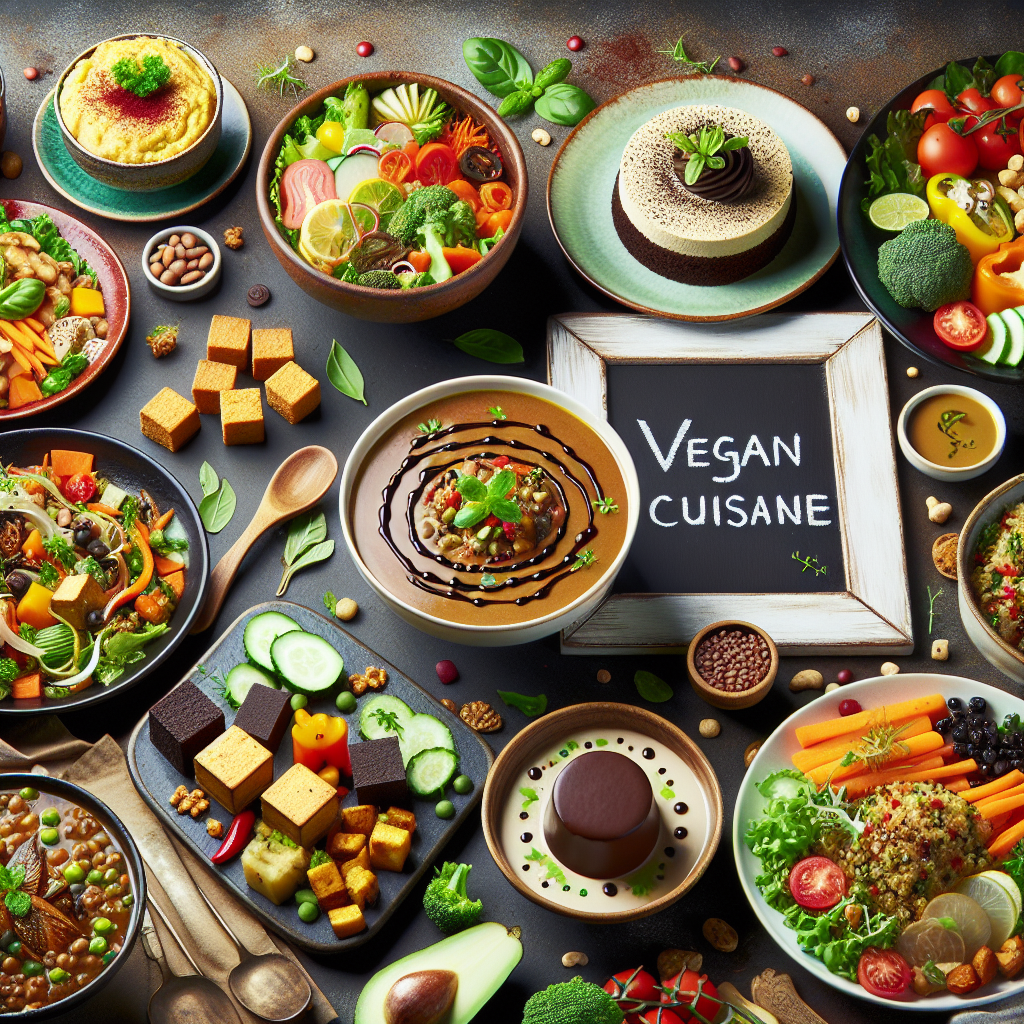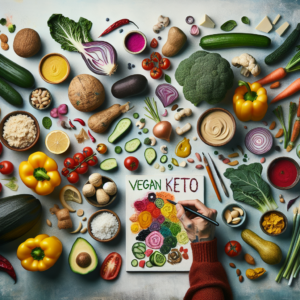Are you looking to embrace a more plant-based lifestyle or simply want to try out some delicious and healthy alternatives? Look no further! In this article, we explore the world of vegan meals, offering a range of mouthwatering options that will tantalize your taste buds and leave you feeling satisfied. From hearty salads packed with nutrient-rich ingredients to flavorsome plant-based substitutes for your favorite comfort foods, we’ve got you covered. Discover the incredible variety and creativity that can be found in vegan cuisine, and embark on a culinary adventure that nourishes both your body and the planet.

What is a Vegan Meal
A vegan meal is a meal that does not contain any animal products. It is completely plant-based, consisting of fruits, vegetables, grains, legumes, nuts, and seeds. Vegan meals exclude meat, poultry, seafood, dairy, eggs, and honey. The focus is on nourishing the body with plant-based ingredients that provide essential nutrients, vitamins, and minerals. Vegan meals can be delicious, nutritious, and suitable for people with various dietary preferences and restrictions.
Definition
Vegan meals adhere to the principles of veganism, which is a lifestyle and dietary choice that seeks to minimize harm to animals, protect the environment, and promote better health. Vegans choose not to consume any animal products or by-products, including meat, dairy, eggs, and honey. They adopt a plant-based diet that focuses on whole, unprocessed foods that are derived from plants. Vegan meals are not only about eliminating animal products but also about embracing a compassionate and sustainable way of eating.
Principles of Veganism
Veganism is based on the principle of not exploiting animals for any purpose. This includes abstaining from consuming meat, fish, poultry, and other animal products. Vegans also avoid using products derived from animals, such as leather, fur, and cosmetics tested on animals. The principles of veganism extend beyond diet to promote a more ethical and sustainable lifestyle. Vegan meals align with these principles, as they prioritize plant-based ingredients that are kind to animals, the environment, and our own well-being.
Benefits of Vegan Meals
Choosing to incorporate vegan meals into your diet can have numerous benefits. Firstly, vegan meals tend to be lower in saturated fats and cholesterol, as they exclude animal products that are often high in these substances. This can contribute to a healthier heart and a reduced risk of certain chronic diseases, including heart disease and hypertension. Vegan meals are also typically rich in fiber, which aids digestion, promotes satiety, and supports weight management.
Moreover, vegan meals are an excellent source of essential nutrients, such as vitamins C and E, potassium, magnesium, and folate. These nutrients are abundant in fruits, vegetables, whole grains, and legumes commonly found in vegan meals. Additionally, plant-based diets have been associated with a lower risk of developing obesity, type 2 diabetes, and certain types of cancer. Vegan meals are also generally more environmentally friendly, as they require fewer natural resources, produce fewer greenhouse gas emissions, and help reduce deforestation and land degradation.
Essential Components of a Vegan Meal
To ensure that a vegan meal is balanced and nutritious, it should include a variety of essential components that provide all the necessary nutrients for optimal health.
Plant-Based Protein
Protein is an essential macronutrient that plays a vital role in building and repairing tissues, producing enzymes and hormones, and supporting overall growth and development. In vegan meals, plant-based protein sources are the primary focus. These include legumes such as lentils, beans, and chickpeas, as well as tofu, tempeh, seitan, and edamame. Nuts, seeds, and whole grains also contribute significant amounts of protein to vegan meals.
Whole Grains
Whole grains are a key component of a well-rounded vegan meal. They provide complex carbohydrates, fiber, vitamins, and minerals. Examples of whole grains include brown rice, quinoa, oats, buckwheat, and whole wheat pasta or bread. Incorporating whole grains into vegan meals helps boost energy levels, supports digestion, and contributes to a feeling of fullness and satisfaction.
Healthy Fats
Healthy fats are an important part of a balanced vegan meal and are necessary for various bodily functions, including hormone production and nutrient absorption. Sources of healthy fats in vegan meals include avocados, nuts (such as almonds, walnuts, and cashews), seeds (such as chia seeds, flaxseeds, and hemp seeds), and plant-based oils (such as olive oil, coconut oil, and avocado oil). Including these fats in vegan meals promotes satiety, enhances flavor and texture, and supports brain health.
Fruits and Vegetables
Fruits and vegetables are the foundation of any healthy diet, and vegan meals are no exception. These colorful and nutrient-dense ingredients provide a wide range of vitamins, minerals, antioxidants, and dietary fiber. It is recommended to consume a variety of fruits and vegetables to ensure a diverse intake of nutrients. Incorporating seasonal and locally sourced produce into vegan meals not only enhances flavor but also supports sustainable agriculture and reduces environmental impact.
Nuts and Seeds
Nuts and seeds are not only an excellent source of plant-based protein but also provide essential fats, vitamins, minerals, and antioxidants. They can be incorporated into vegan meals in various ways, such as sprinkling them on top of salads, blending them into sauces and dressings, or using them as a base for plant-based spreads and dips. Almonds, walnuts, chia seeds, flaxseeds, and hemp seeds are just a few examples of the wide variety of nuts and seeds available.
Alternative Dairy Products
For those who enjoy the creamy texture and taste of dairy products but follow a vegan diet, there are plenty of plant-based alternatives available. Vegan milk options include almond milk, oat milk, soy milk, coconut milk, and rice milk. These can be used in various recipes, such as smoothies, desserts, and baked goods. Vegan cheese, yogurt, and ice cream are also available, made from plant-based ingredients such as cashews, almonds, soy, and coconut.
Herbs and Spices
To flavor vegan meals and add depth to dishes, herbs and spices play a crucial role. Fresh or dried herbs such as basil, cilantro, rosemary, and mint can elevate the taste of soups, salads, and sauces. Spices like cumin, turmeric, paprika, and cinnamon can bring warmth and complexity to vegan meals. Experimenting with different combinations of herbs and spices can turn a simple vegan dish into a flavor-packed culinary delight.
Types of Vegan Meals
Vegan meals can cover a wide range of culinary styles and flavors, catering to different preferences and occasions. Whether you’re looking for breakfast options, lunch and dinner ideas, snack options, dessert recipes, or beverages, there are plenty of delicious vegan options to explore.
Breakfast Ideas
For a satisfying vegan breakfast, consider options such as overnight oats topped with fresh fruits and nuts, avocado toast on whole grain bread, smoothie bowls packed with fruits and veggies, tofu scramble with veggies and spices, or chia seed pudding infused with flavors like vanilla, chocolate, or matcha.
Lunch and Dinner Ideas
Vegan lunches and dinners can be vibrant, filling, and full of flavor. Try dishes like vegetable stir-fries with tofu or tempeh, hearty soups and stews packed with legumes and vegetables, nourishing Buddha bowls filled with grains, greens, and plant-based protein, flavorful curries made with chickpeas or lentils, or plant-based burgers and sandwiches loaded with veggies and vegan mayo.
Snack Options
When it comes to vegan snacks, there are many plant-based options to choose from. Enjoy roasted chickpeas, veggie sticks with hummus or guacamole, homemade energy bars made with nuts, seeds, and dried fruits, air-popped popcorn sprinkled with nutritional yeast, or fruit and nut combinations for a quick and satisfying snack on the go.
Dessert Recipes
For those with a sweet tooth, vegan desserts offer a guilt-free indulgence. Treat yourself to vegan chocolate avocado mousse, dairy-free ice cream made with coconut milk or cashew cream, freshly baked vegan cookies or brownies made with plant-based ingredients, or fruit-based desserts such as berry cobblers or apple crumbles.
Beverages
Vegan beverages go beyond water. Explore options like smoothies made with fruits, vegetables, and plant-based milk, herbal teas infused with flavors like chamomile, peppermint, and hibiscus, dairy-free lattes and cappuccinos made with almond or oat milk, refreshing fruit-infused waters, or homemade plant-based milks such as almond milk or cashew milk.
Tips for Creating Balanced Vegan Meals
Creating balanced vegan meals is essential to ensure that you’re getting all the necessary nutrients. Consider the following tips to help you achieve a well-rounded plant-based diet.
Protein Combining
While plant-based proteins can provide all the essential amino acids the body needs, it is recommended to combine different plant protein sources throughout the day to ensure a varied amino acid profile. For example, pairing legumes with whole grains or seeds helps create a complete protein. Consider combinations like lentils with quinoa, peanut butter on whole wheat bread, or a salad with chickpeas and sunflower seeds to optimize protein intake.
Whole Food Choices
Focus on incorporating whole, unprocessed foods into your vegan meals. These include fruits, vegetables, legumes, whole grains, nuts, and seeds. Avoid heavily processed vegan alternatives that may be high in salt, sugar, and unhealthy fats. Opting for whole foods maximizes nutrient density and ensures you’re fueling your body with the vitamins, minerals, and fiber it needs.
Colorful and Diverse Plates
Make your vegan meals visually appealing by incorporating a variety of fruits and vegetables of different colors. Each color represents different phytochemicals, which provide a range of health benefits. Aim to have a rainbow on your plate by including red, orange, yellow, green, blue, and purple fruits and vegetables. This diverse selection ensures a wide spectrum of antioxidants, vitamins, and minerals.
Meal Planning and Prepping
Planning and prepping your meals in advance can help ensure that you have balanced vegan options readily available. Set aside time each week to plan your meals, make a grocery list, and batch cook staple ingredients like grains, legumes, and roasted vegetables. Having meal prepped components on hand allows you to assemble nutritious meals quickly and easily throughout the week.
Exploring International Cuisines
Embrace the global variety of vegan cuisine by exploring different international flavors and ingredients. Japanese cuisine offers sushi rolls filled with vegetables or tofu, Indian cuisine boasts flavorful curries made with lentils and chickpeas, Mexican cuisine features bean and veggie-filled tacos and burritos, and Mediterranean cuisine showcases delicious dishes like hummus, falafel, and tabbouleh. Experimenting with different flavors and spices keeps vegan meals exciting and diverse.

Vegan Meal Prep
Meal prepping can be a game-changer when it comes to maintaining a vegan lifestyle. It allows you to save time, reduce stress, and ensure that you have nutritious meals ready to enjoy throughout the week.
Benefits of Meal Prepping
Meal prepping provides numerous benefits. It saves time by allowing you to cook and prepare meals in advance, eliminating the need to cook from scratch every day. It also helps reduce food waste, as you can portion and store leftovers for future meals. Additionally, meal prepping can save you money by minimizing impulse purchases and takeout meals. Most importantly, it ensures that you have healthy, balanced vegan meals readily available, making it easier to stick to your dietary goals.
Weekly Meal Planning
Start by taking some time each week to plan your meals. Look for vegan recipes and inspiration, and create a meal plan for the upcoming week. Consider the ingredients you already have on hand and make a grocery list for the items you need. Planning your meals in advance allows you to ensure that you’re incorporating a variety of nutrients and flavors into your weekly menu.
Batch Cooking
Batch cooking involves preparing larger quantities of staple vegan ingredients at once. Cook a big batch of grains like quinoa or brown rice, roast a tray of mixed vegetables, and simmer a pot of beans or lentils. These components can be used as the base for various meals throughout the week, saving you time in the kitchen. Portion out the cooked ingredients into individual containers for easy grab-and-go meals.
Storage and Freezing Tips
Proper storage is crucial when meal prepping vegan meals. Invest in airtight containers that can be easily stacked in the refrigerator or freezer. Label each container with the contents and the date it was prepared. Refrigerated meals typically last for up to four to five days, but freezing can extend the shelf life for even longer. If freezing, ensure that you allow meals to cool completely before sealing and freezing them in portion-sized containers.
Popular Vegan Meal Recipes
There is a wide variety of delicious vegan recipes available to suit every taste and preference. Here are some popular and versatile vegan meal options to inspire your culinary adventures.
Vegan Buddha Bowl
A Buddha bowl is a nourishing and filling meal that typically consists of a combination of cooked grains, roasted or raw vegetables, plant-based protein, and a flavorful sauce or dressing. Customize your Buddha bowl with ingredients like quinoa, roasted sweet potatoes, sautéed kale, chickpeas, avocado, and tahini dressing.
Chickpea Curry
Chickpea curry is a flavorful and hearty vegan meal that combines cooked chickpeas with a rich tomato-based sauce infused with aromatic spices such as cumin, coriander, turmeric, and garam masala. Serve it over steamed rice or with freshly baked naan bread for a satisfying and nutritious meal.
Quinoa Salad
Quinoa salads are versatile and refreshing options that can be enjoyed as a main dish or as a side. Combine cooked quinoa with colorful vegetables such as cherry tomatoes, cucumbers, bell peppers, and fresh herbs. Add a tangy dressing made from lemon juice, olive oil, and Dijon mustard for a vibrant and nutritious salad.
Tofu Stir-Fry
Tofu stir-fry is a quick and easy vegan meal that is packed with plant-based protein and vegetables. Sauté tofu cubes with an array of vegetables like broccoli, bell peppers, carrots, and snap peas. Flavor it with soy sauce, garlic, and ginger, and serve over steamed rice or noodles for a delicious and satisfying meal.
Vegan Chili
Vegan chili is a comforting and flavorful meal that is perfect for colder days. Replace meat with beans, such as kidney beans, black beans, and pinto beans, to create a hearty and protein-rich chili base. Add diced tomatoes, bell peppers, onions, garlic, chili powder, cumin, and other spices to enhance the flavor. Serve it with a side of cornbread for a complete and filling meal.
Sweet Potato and Black Bean Burritos
Sweet potato and black bean burritos are a satisfying and portable vegan meal option. Roasted sweet potatoes, cooked black beans, sautéed onions, and bell peppers are wrapped in a tortilla and topped with salsa, guacamole, and vegan sour cream. These delicious burritos can be enjoyed for lunch or dinner.
Vegan Pizza
Vegan pizza offers a plant-based twist on a classic favorite. Use a homemade or store-bought vegan pizza crust, then top it with tomato sauce, vegan cheese, and a variety of colorful vegetables like mushrooms, bell peppers, onions, and olives. Bake until the crust is golden and the cheese is melted for a mouthwatering vegan pizza experience.
Pasta Primavera
Pasta primavera is a vibrant and flavorful vegan pasta dish that showcases a medley of seasonal vegetables. Toss cooked pasta with sautéed zucchini, carrots, peas, cherry tomatoes, and asparagus. Finish with a light sauce made from olive oil, garlic, lemon juice, and fresh herbs for a delicious and refreshing meal.
Vegan Burger
Vegan burgers are a satisfying and versatile option that can be made from various plant-based ingredients. Create a patty using black beans, lentils, chickpeas, quinoa, or mushrooms. Grill or bake the patty and serve it on a whole grain bun with lettuce, tomato, onion, and your choice of condiments for a hearty vegan burger experience.

Vegan Meal Substitutes
Transitioning to a vegan diet may require some substitutions to replicate the flavors and textures of animal-based ingredients. Here are some commonly used vegan substitutes.
Plant-Based Protein Sources
When it comes to replacing animal-based proteins in vegan meals, there are plenty of options available. Legumes such as lentils, chickpeas, and black beans are excellent sources of plant-based protein. Tofu, tempeh, and seitan also provide substantial amounts of protein. Additionally, plant-based protein powders, such as pea protein or brown rice protein, can be used in smoothies or baked goods.
Dairy Alternatives
To replace dairy products, there are numerous plant-based alternatives that mimic the taste and texture of traditional dairy. Almond milk, soy milk, oat milk, and coconut milk are popular choices for replacing cow’s milk in recipes and beverages. Vegan cheese made from cashews, almonds, or soy is available in various flavors and can be used for melting, grating, or spreading. Coconut or cashew-based yogurt can be used in place of traditional yogurt, and vegan butter made from plant-based oils can be substituted for butter in cooking and baking.
Egg Replacements
Eggs serve various functions in baking and cooking, but there are reliable vegan substitutes available. Mashed bananas or applesauce can be used as a replacement for eggs in recipes like pancakes, muffins, and quick breads. Silken tofu or flaxseed meal mixed with water can also act as an egg binder in baking. Additionally, commercial egg replacers made from potato starch or chickpea flour can be used to mimic the binding properties of eggs.
Substituting Meat in Recipes
Vegan meals often require alternatives to meat in order to replicate the flavors and textures of traditional dishes. Plant-based options such as tofu, tempeh, and seitan can be used as substitutes for meat in stir-fries, curries, and other savory dishes. Furthermore, mushrooms, jackfruit, and lentils can be excellent substitutes for ground meat in recipes like burgers, chili, and meatloaf.
Vegan Meals for Different Dietary Restrictions
Vegan meals can be adapted to accommodate different dietary restrictions, ensuring that everyone can enjoy the benefits of plant-based eating.
Gluten-Free Vegan Meals
For individuals following both a gluten-free and vegan diet, it is important to focus on naturally gluten-free ingredients. Use ingredients like quinoa, rice, buckwheat, potatoes, and legumes as the base of meals. Utilize gluten-free grains, such as millet, sorghum, and gluten-free oats, to diversify options. Be cautious when using processed vegan products, as some may contain gluten or be cross-contaminated. Checking labels and sourcing certified gluten-free ingredients is essential to ensure a gluten-free vegan diet.
Soy-Free Vegan Meals
While soy and soy-based products are common in vegan diets, there are plenty of soy-free alternatives available. Opt for protein sources like legumes, lentils, quinoa, tempeh, and seitan to replace soy-based products. Look for vegan alternatives made from rice, almond, hemp, or pea protein instead of soy-based alternatives like tofu or soy milk. It’s important to read labels and check for hidden sources of soy in processed vegan products.
Nut-Free Vegan Meals
For individuals with nut allergies, there are still plenty of vegan meal options available. Focus on using seeds like pumpkin, sunflower, chia, and hemp as sources of healthy fats and protein. Additionally, use alternative dairy products made from sources like oats or coconut instead of nut-based options. Take care when choosing packaged foods, as many vegan products contain nuts or may be cross-contaminated. Always read labels and choose nut-free alternatives to ensure a safe and enjoyable vegan meal.
Low-Carb Vegan Meals
A low-carb vegan meal plan can be achieved by minimizing starchy foods and focusing on non-starchy vegetables, plant-based proteins, and healthy fats. Incorporate vegetables, such as leafy greens, broccoli, cauliflower, zucchini, and bell peppers, as the main component of meals. Pair these with protein sources like tofu, tempeh, seitan, or plant-based protein powders. Use healthy fats from avocados, coconut oil, olive oil, and nuts and seeds. Low-carb vegan meals can be creative and satisfying by combining flavors and textures while keeping carbohydrate intake in check.

Vegan Meals for Special Occasions
Vegan meals can be enjoyed during special occasions and holidays, allowing everyone to partake in the celebration while still adhering to their dietary choices.
Thanksgiving
Vegan Thanksgiving meals can be just as delicious and comforting as traditional ones. Roasted vegetables like sweet potatoes, Brussels sprouts, and butternut squash make great side dishes. Stuffing can be made with hearty bread, vegetable broth, onions, celery, and herbs. A flavorful mushroom gravy can be poured over mashed potatoes or lentil loaf. For dessert, a pumpkin pie made with a vegan crust and coconut milk can be the perfect finale to a vegan Thanksgiving feast.
Christmas
Vegan Christmas meals can showcase festive flavors and bring joy to the table. Nut roasts made with lentils, nuts, and vegetables provide a meaty and flavorful centerpiece. Maple-glazed roasted root vegetables, cranberry sauce, and stuffing made with bread, vegetables, and herbs complement the main dish. Vegan gingerbread cookies, spiced apple cider, and vegan Yule log cake can add a sweet touch to the holiday celebration.
Easter
Vegan Easter meals can be filled with fresh and vibrant ingredients. Spring vegetable salads featuring asparagus, peas, radishes, and baby greens can make a refreshing side. Stuffed bell peppers or portobello mushrooms can serve as an elegant main dish. Vegan deviled eggs made with tofu or chickpea flour can be a fun appetizer. Vegan carrot cake or lemon bars can provide a delightful Easter dessert.
Birthday Parties
Vegan birthday meals can be tailored to the celebrant’s favorite flavors and treats. Vegan pizza topped with vegetables and dairy-free cheese can be a crowd-pleaser. Plant-based burgers loaded with toppings, vegan mac and cheese, and tasty finger foods like vegan spring rolls or buffalo cauliflower wings can be a hit at any birthday party. Finish off with vegan cupcakes or a vegan chocolate cake for a sweet and celebratory ending.
Conclusion
Embracing a vegan lifestyle and enjoying the benefits of vegan meals can be a rewarding and fulfilling choice. By incorporating plant-based ingredients into our meals, we not only nourish our bodies but also contribute to a more sustainable and compassionate world. Vegan meals can be delicious, diverse, and suitable for people with various dietary preferences and restrictions. With a variety of plant-based protein sources, whole grains, healthy fats, fruits, vegetables, and creative substitutes, vegan meals can provide all the essential nutrients while captivating our taste buds. So, let’s explore, create, and savor the joys of vegan meals as we embark on a journey towards better health and a brighter future.





